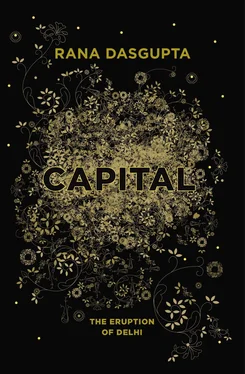“We will not go,” echoes Jahanara. “They tricked us once. They will not do so again.”
Meenakshi says, “When they told us they wanted everyone to leave, people from Bhalswa knew if they didn’t fight they would be left with nothing. For this they were prepared to be beaten by the police. So we decided to hold a protest during the Commonwealth Games to try and embarrass the government into finding another solution. While millions of rupees were being spent on a huge sports event that benefitted no one, the people who needed money were not getting it; in fact the government was taking money away from them and knocking down their houses. So we decided to go out, the whole community, and block the main highway that runs near here. Students and teachers from Delhi University organised the protest with us: many of them are interested in our situation, which no one else is.
“Bhalswa was badly affected by the flood at that time but everyone decided it was essential to participate in the protest. Around 5,000 women came out of their houses and blocked the road. For forty minutes, the traffic was jammed on the highway. First the police came from one station and then they called up other stations. The assistant commissioner ordered the police to attack us with batons. Women were badly beaten up and one had to go to hospital with broken bones. We called an ambulance but they refused to help us. Students from Delhi University were arrested.
“I should say that our women also fought the police. They snatched police batons and hit back. To our great shock, the police identified one of these women and began to intimidate her. They got hold of her son and found out where she worked. Later, the police went to the place where she worked and told her never to do anything like that again. They like to target individuals, because individuals are not strong on their own. But we are never going to give up.”
“When they come to ask us for our vote, they don’t come in cars,” says Jahanara. “They come on foot and they say to us, ‘Sister, please take care of us.’ It is we who win them elections and make emperors of them. The money they grab is our money. So it is our right to fight the government. We are also citizens of this country.
“We have all had many threats. Men came to our house with big sticks and threatened my husband. They said, ‘Control your wife or you will face serious consequences.’ After that my husband started fighting with me. I told him not to get involved in all this: I was the one who was taking care of the family.
“They are the government. They can lodge false cases against us and send us to jail any day. They control everything. If they sanction 10 crore rupees for us, only 2 crores will reach us. The only thing I am afraid of is the government. They will try to seize everything we have.”
Saraswati is enraged.
“If I ever meet the chief minister of Delhi, I will hit her so hard she can’t even imagine! They brought us here on the basis of lies. If they had shown us this land before, we would never have come here. This is the place where all of Delhi’s trash is dumped and she thinks we can be dumped here too. Someone make her live here, then she will realise what it is. And now they want us to leave again! If they try to force us to leave this place, we will break their heads. We had to sell our house in the village to get this plot. Many of us are still paying back loans to moneylenders ten years later for those 7,000 rupees that bought us nothing. We are not leaving.”
The postman comes to drop a letter. His arm has been severed at the elbow.
Meenakshi says, “The majority of the people, the people who actually run this city, are being eliminated from it. They are not welcome here anymore. The city is being remade for rich people. Only people who have cars can live here. Look at the structure: the flyovers, malls, hotels, and other luxuries. It is all meant for people with money. Look how much money is spent on flyovers, and who is using them? Only those with money. What use are they to people who walk? You cannot walk on them. People who walk cannot move in this city: there is no place for them.
“The Metro only links those places where there are offices or posh neighbourhoods. It doesn’t link any places where working-class or poor people live. So the Metro just supports people who have money. A poor man can’t afford a Metro ticket. And poor people travel with a lot of stuff: they cannot take it on the Metro. They have to travel by bus.
“But now they have introduced new buses which cannot serve the poor. They are pretty green buses and they brought them in to make the city look good for the Commonwealth Games. They have special low floors to make it easy for people to get on — even people in a wheelchair can get on. But these buses can only travel on flat roads. So they have cancelled all the buses that used to come to this colony. The transport people simply say that there is no road and we can’t come there.
“Everything is getting worse. Everything. Ultimately it is not only the poor who will suffer. I come from a middle-class family and I can tell you from my personal experience that in the near future even a middle-class family won’t be able to raise their children in Delhi. The people of Bhalswa are afraid for their future, but I too have a deep fear inside me. Because I don’t know what will happen to any of us in the future. It’s not only the poor.”
Saraswati says, “Sometimes we wonder if we should ever have left the village. Many of those who stayed behind have ended up better off. Many of the men went to do construction work in Saudi Arabia or Dubai where they make more money. We don’t have anything. Whatever we had earlier we sold for a better place in Delhi. We thought one day we would have our own flat in Delhi.”
Jahanara says, “The villages have also changed since we left. The schools have become better. Our relatives who stayed behind raised their children better than we did. The villages have seen a big change in the last few years.
“But we can never go back. We sold our property in the village, and whatever we still have has been taken by our relatives. It’s better to fight with the government than with your family. In a fight with your family, you will die. So we will stay here. No matter what they do.”
• • •
Meenakshi walks with me as I depart.
“How did you get here?” she asks.
“I took an auto-rickshaw from the Metro station.”
“You’re lucky,” she says. “Most of them won’t come here.”
As we walk through the township I realise that the streets we entered by were the very best. Others are in far worse condition. Some of the road surfaces have been washed away in the rains, and residents are laying fresh concrete to mend them. The streets where the ragpickers live are full of piles of trash that is being sorted in homes. At the end of the township is a den where men smoke crack behind a tarpaulin. Their kids sit around outside. One girl makes a pattern out of the pieces of a broken plant pot. Other kids are at work sorting garbage or arranging in boxes the jamun fruit they have picked from trees. Chickens forage. The puddles are covered with strange swarms of tiny flies such as I have never seen before: at the slightest movement the entire swarm takes off, but it stays together, a cloud-organism, and then lands all in one go on the puddle again.
The only way out of this place is a community bus. We get on. The thing travels at a fantastically slow pace around the potholes, stopping every few minutes to let people on or off. It takes us an hour to get out of Bhalswa. This is partly because of a big argument over unpaid fares, which leads the driver to stop the bus in protest until the three men in question either get off or pay. They refuse to do either. It is Meenakshi who intervenes. She offers to pay their fares for them. But they prefer to get off the bus than pay, and do so.
Читать дальше











